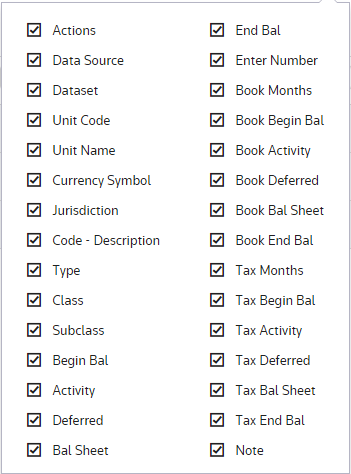After Tax Temporary Differences - Book/Tax Basis
In the Data Entry list, you can select the After Tax Temporary Differences - Book/Tax Basis component to enter federal and jurisdiction data. In the After Tax Temporary Differences - Book/Tax Basis page, you can refresh, export (informational purposes), print, add, edit, delete, import, export (template), group columns, show/hide columns, and filter your provision and estimated payment data. There are two tabs available to enter your data: Detail and Rollforward.
Provision dataset only
•There are two sections: Detail and Rollforward. By default, the Detail section displays first. All users can enter and modify data in both sections, also by default. Administrators can use the DEFAULT_TD_TAB and RESTRICT_TD_TABS dataset parameters to change the section that displays by default and determine whether or not Read/Write users can enter data in the Details section.
•The system computes the Tax-Book Difference using the book and tax amounts entered in the Detail section. This information also displays in the Rollforward section.
•For information on the Rollforward section, go to the Rollforward page.
Provision and Estimated Payments datasets
•The Activity and Deferred column amounts impact the tax provision differently.
•To import information to the After Tax Temporary Differences - Book/Tax Basis screen, complete the appropriate fields on the #UATTDAM# U AfterTxTD-Bk Tx Bas sheet in the Import Numbers template. For more information on importing, refer to the Importing Templates documentation.
•If you wish to adjust the same after tax temporary difference more than once, you must make additional entries using different tag letters.
Import Template
To import information to the After Tax Temporary Differences - Book/Tax Basis page, complete the appropriate fields on the #UATTDAM# U AfterTxTD-Bk Tx Bas worksheet in the Import Numbers template.
See Data Entry Import for more information about the After Tax Temporary Differences - Book/Tax Basis data import process.
After Tax Temporary Differences - Book/Tax Basis

Data Entry Fields
The grid lets you enter amounts and select options from the drop-down lists. You can use the tab key to move between the fields much like an excel worksheet.
The After Tax Temporary Differences - Book/Tax Basis component grid includes the following columns. See Data Table for more information about the grid options.

Actions
Actions allow you to supplement the adjustment with detail. Double click ![]() to add an attachment.
to add an attachment.
Data source
Data Source enables you to view the Data Source History.
Dataset
The Dataset selected in the Base Dataset drop-down list.
Unit Code
The Unit Code is established by an Administrator for the After Tax Temporary Differences - Book/Tax Basis.
Unit Name
The Unit Name is established by an Administrator for the After Tax Temporary Differences - Book/Tax Basis.
Currency Symbol
The Currency Symbol is established by an Administrator for the After Tax Temporary Differences - Book/Tax Basis.
Jurisdiction
Jurisdiction lets you select the jurisdiction for the adjustment.
Code - Description
The code and description are established by an Administrator for the after tax temporary difference.
Type
There are two types of temporary difference balances - Current and Non-Current. Select the type that best relates to the balance sheet account where the deferred tax asset or liability should be represented.
Tag
The tag letter identifies each line entered in the originating source.
Class
The class identifies each line entered in the originating source.
Subclass
The subclass identifies each line description entered in the originating source. You can select Next Value as the subclass and the application generates the next "Code" number for the selected Code, Type and Class.
Beginning Balance
The beginning balance rolls over from the prior period and should represent the remaining temporary differences for book and tax that should be allocated. The beginning balance can be overridden manually or with an import.
Note: The administrator has the ability to lock beginning balances and the Beginning Bal column does not allow data entry for Read/Write Users.
Enter Activity/Enter Ending
Select Enter Activity or Enter Ending balance to apply to both book and tax calculations:
•Enter Activity - You can enter data in Activity, Deferred, and Balance Sheet fields. The system automatically calculates the Ending balance, which is Read-Only.
•Enter Ending - You can enter data in Ending Balance, Deferred and Balance Sheet fields. The system automatically calculates the Activity, which is Read-Only.
Activity
•The activity is the appropriate amount of the beginning balance based on the months entered. In a dataset that was not rolled over, you must populate this field.
•Activity impacts the current and deferred provision, as well as deferred balances.
•Positive amounts increase and negative amounts reduce the taxable income. Amounts should be entered in local currency. They are translated using the unit's weighted average FX rate to the reporting currency.
Deferred
Deferred impacts the deferred provision, as well as the deferred balances.
Balance Sheet Only
•Balance only impacts deferred balances.
•Typically this entry type is used for the impact of equity or other comprehensive income items.
Note: You will need to activate the parameter to view the Audit Trail created when working with the Enhanced Integration transfer. For more information on Enhanced Integration, see the Enhanced Integration User Manual.: The Balance Sheet Only (BSO) adjustment on the Tax Provision report removes the BSO Adjustment from the Deferred Provision.
Ending Balance
The ending balance based on the months entered. In a dataset that was not rolled over, you must populate this field.
Months
The months entered for both book and tax are used to compute the ratable amount applicable to the period.
Note
You can type notes to supplement the adjustment. You can access a history of the Notes within "Data Source History."
